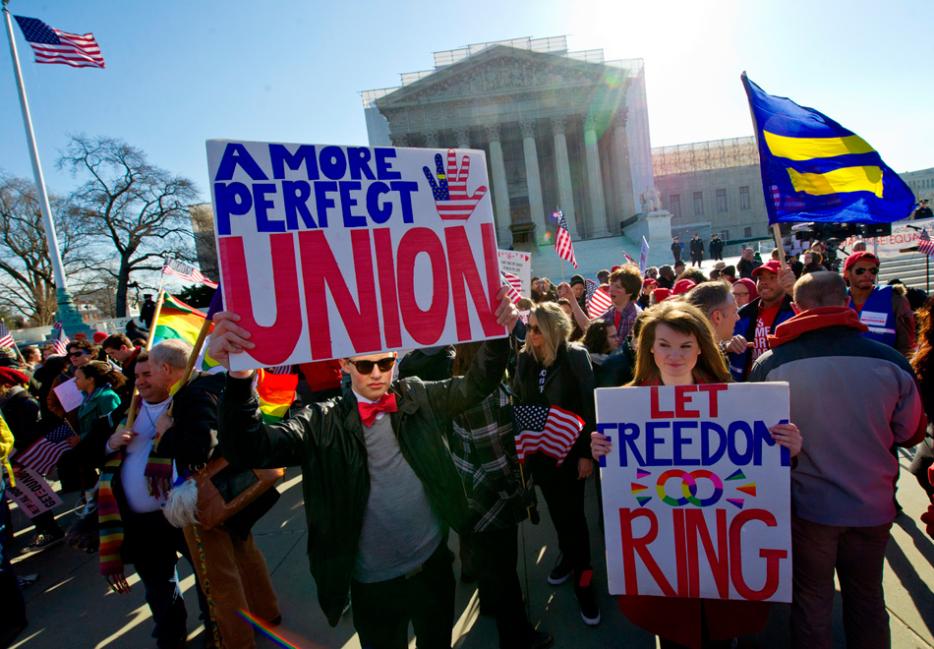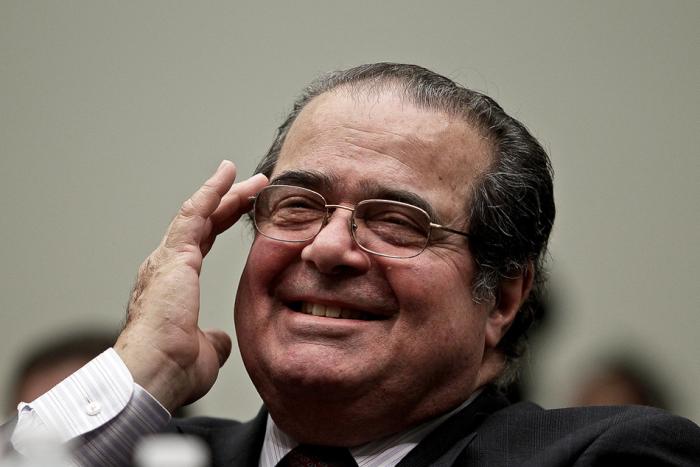Do you remember where you were, in 2004, when the Ontario Court of Appeal ruled on the constitutionality of same-sex marriage? At the time, I was actually a law student at McGill, and constitutional law and rights have always been my thing, and still I don’t remember the momentous event that well. I remember it coming about suddenly, and feeling both that it should have happened long ago and surprised that it happened at all. In Canadian law schools, at least, the idea that equality is an evolving thing is an article of faith. Just say the words “living tree” to the law student closest to you and watch his or her eyes glaze over in pleasure. The notion that the law has to change with changing times is a sacred principle in Canadian human rights legislation.
Today our American friends came a little closer to joining us.
It has been a rough week, actually, for the Supreme Court of the United States. It isn’t hard to see why the public relations office ordered the opinions in this way. First, they chipped away at sexual harassment laws. They shrugged at a challenge to an affirmative action policy at the University of Texas, acting as if they just wished it would all go away. Then, they killed a longstanding set of rules about state voting in a country that just over ten years ago suffered from electoral chaos due to the nitty-gritty of voting procedure. Today’s ruling gives them the power to finish on a high note.
And, to be fair to the Court, it is a very high note. Let’s be clear on one thing: this is not a decision that “legalizes” same-sex marriage, per se. The Defense of Marriage Act only spoke to the question of whether federal law had to recognize same-sex marriages legalized by the states. But the opinion in United States v. Windsor, the DOMA case, contains some language that any future case challenging the constitutionality of pro-same-sex marriage legislation will find hard to get around. For example:
In acting first to recognize and then to allow same-sex marriages, New York was responding “to the initiative of those who [sought] a voice in shaping the destiny of their own times…” These actions were without doubt a proper exercise of its sovereign authority within our federal system, all in the way that the Framers of the Constitution intended.
This means that absent a Constitutional amendment prohibiting same-sex marriage, the court has now declared that the states are free to regulate marriage as they see fit. And, moreover, that the U.S. government has to recognize those marriages as legit, no matter what Congress wants. Plus:
This status is a far-reaching legal acknowledgment of the intimate relationship between two people, a relationship deemed by the State worthy of dignity in the community equal with all other marriages. It reflects both the community’s considered perspective on the historical roots of the institution of marriage and its evolving understanding of the meaning of equality.
So now, any future court that wants to make the case that equality does not require the recognition is going to have to argue that it is not a part of this “considered perspective” on the “evolving understanding of equality.” And the court was pretty explicit in its approval of where our notion of equality is evolving to, at least on this question:
The differentiation demeans the couple, whose moral and sexual choices the Constitution protects, see Lawrence, 539 U. S. 558, and whose relationship the State has sought to dignify. And it humiliates tens of thousands of children now being raised by same-sex couples. The law in question makes it even more difficult for the children to understand the integrity and closeness of their own family and its concord with other families in their community and in their daily lives.
This part of the decision sent Scalia on a long, ranty whine in his dissent. He sees the writing on the wall here. For a long time, the debate in the same-sex equality question in the U.S. was about “standard of review,” which, as a fancy term of art, simply asks how willing a court is to stand up to the legislature. Conservatives could sail by on the argument that courts should defer to the apparently superior reasoning of Congress. Legal procedure has a way of occluding reality in such a fashion, which is why you see people get so married to it; it’s a thing they can control in the way they can’t control other people. But there is no “standard of review” under which legislation that deliberately “demeans” and “humiliates” American citizens could possibly survive, and Scalia knows it. He and Justice Roberts, who both observe that the majority seems to be saying that DOMA was an act of “malice,” are right about that.
I predicted this result to friends (and the editors of this here fine website) earlier in the week, just guessing after the hardline stance the Court took on affirmative action. Yesterday’s voting rights decision only cemented my suspicions. In each case, the slim majority survived on the notion that things have changed in the U.S. That in those cases the Court’s idea of the facts were wrong—Americans are not post-racial, any more than Canadians are the peaceful “mosaic” we so often claim for ourselves—meant the only risk to DOMA was that Justice Anthony Kennedy would wake up on a crucial morning thinking that a same-sex marriage was obviously unequal to his own. And that was unlikely to happen.
So for those still depressed about all the other regressive decisions in the United States this week, there is a silver lining. The fact is that the only real road to equality is to believe in equality as a process. The attitude that sees equality as a box we’ve ticked off ignores the way inequality actually happens. It is not just a thing you declare; it’s a thing you have to work to enforce in small ways, every day. It happens in the way men put women down at work, and women help them to do it. It happens in the way one designs voting procedures to confound the elderly and the uneducated. It happens in the way a policeman is more likely to arrest you if you’re black, or a First Nations person. And the more the law sees the need to evaluate equality in these small, contextual ways, the harder it is for them to ignore reality. The death of equal treatment under the law is when we speak in abstraction, because of course there are few people who in the abstract believe African-Americans shouldn’t have the vote, or that women ought to be sexually harassed. The key is to ask whether those things are actually happening.
The truth, as DOMA showed, is that they are. You can believe in the dignity of same-sex couples until the cows come home, but in a country where someone cannot help a partner immigrate, or even bequeath property to them, your belief is an empty, useless thing. It is not a belief in equality. It’s a sort of magical thinking that believes attitudes matter more than the real, actual details of life. The thing about a living tree, after all, is that it’s rooted in the real world.






